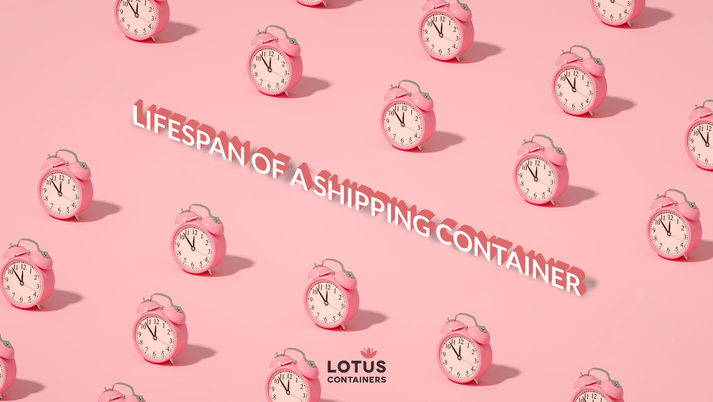Shipping containers in today’s time are used for various purposes. They are turned into multi-functional buildings, office spaces, storage, and garages after serving their role as freight containers. The lifespan of a shipping container is one of its many benefits. Investing in one of these containers is profitable due to its longevity. Here, in this blog, the focus will be solely on the shipping container’s lifespan.
The Average Lifespan of the container
Shipping containers are made of a particular type of steel called corten steel. Alongside high strength, corten requires low maintenance and is best known for its longevity. The average lifespan of a shipping container is around 25 years. The longevity of steel shipping containers remains even after they are withdrawn from the cargo ships. When appropriately maintained, freight containers can also last between 35-40 years.
Signs that you require container maintenance
Rusting
Rust can severely damage your metal shipping container, irrespective of the fact that it is built using corrugated solid corten steel. As soon as you notice the rust patches on your cargo container, it is advised to use a commercial wetting agent, mild bleach, or anti-mildew solution along with a water hose and broom. This solution helps to release rust and dirt off your shipping unit.
Difficulty in opening and closing container doors
The main factor contributing to the difficulty in shipping container door opening and shutting may be the uneven surface of the container. When placed on the ground for too long and without any foundation, containers tend to become unlevel.
Make sure that the container’s four corners are contacting the ground. Also, inspect if each corner casting is level with the other. If there seems to be a problem, your container will require releveling. Blocking your container by placing a concrete pad block, railroad ties, or other strong blocks underneath the corners can help level the container. Moreover, you can also relocate and create a foundation if needed.
Container Rain
Containers spend most of their life on the ocean or in the nearest vicinities. And as we all know, the moisture content near the sea is very high. This moisture gets trapped in them, which results in units rain after shipping container condensation. This container rain is very harmful to the moisture-sensitive goods placed inside the container and results in container damage due to warping and corrosion.
Foul Odour
Sometimes a bad air conditioning filter can affect the flow of air in and out of the container resulting in faulty odour. Always inspect if there is any bad smell in your container and contact the professional to clean the evaporator coil, clear the condensation drain line, and check the air duct lines for any leaks, if required.
Ways to make shipping containers last longer
Proper care and maintenance are crucial to getting the most out of your maritime shipping container. It doesn’t matter how solid and durable a cargo box is; if not taken care of properly, it will worsen over time. Given below are some of the methods that can help you extend the lifespan of the shipping container.
Apply rust-resistance paint
Though shipping containers are made to withstand the harsh sea climate, they are not invincible. They can still be affected by the rust. If you notice rust patches, sandblast them down and apply rust-resistant paint.
Inspect roof regularly
Excess debris on the container’s roof leads to a high moisture content trash. Ensure that debris doesn’t accumulate over the container’s roof for a long duration. Also, the top must be checked regularly to ensure no dents are formed. If your container has dents, fill them with a sealant, such as caulk to prevent further damage.
Place container on a foundation
Placing your container on a foundation rather than plain ground is always safer. It will help to reduce the chances of moisture seeping into the container through the base and will also help to keep the container secure and rust-free.
Proper ventilation system
As discussed earlier, container rain is responsible for degrading the container and the content placed inside. To prevent your container from being damaged, use desiccants, which will help keep your container well-ventilated and dry.
Applying lubrication
Lubrication must be applied regularly to all those parts of the shipping container that are more prone to rust, such as the door and hinges. A well-lubricated container will help to keep the rust at bay.
Inspecting A/C unit filters
A faulty air conditioning system in reefers or insulated containers creates a damp smell inside the shipping box. It would be best to remain proactive with the changing weather and regularly inspect the air conditioning systems to prevent foul odours. Also, keep in check with climate control professionals for the safety and longevity of your cargo container.
Keeping up with this essential measure will help extend the shipping container’s lifespan. Working on this will help you increase the longevity and enhance the sustainability of your refrigerated or insulated container.
Buying shipping containers itself is a considerable investment. Before buying one, you should gain all the necessary insights on the questions like what the average lifespan is, what factors can harm it, and how to extend the longevity of your maritime containers. Being clear about these questions will help you make the best decision. We hope this blog has cleared all your possible queries regarding the lifespan of a shipping container.
LOTUS Containers is one of the significant shipping container companies that has been dealing in the shipping container business since 2008. We are best known for providing top-quality corrugated shipping containers in Miami, Ohio, Florida, and other parts of the USA and the world.




